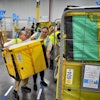DETROIT (AP) -- The man expected to become the next president of the United Auto Workers says workers should share in the profits if the auto industry recovers. But he also wants to make sure Detroit automakers stay competitive.
UAW Vice President Bob King says unionized workers each gave up $7,000 to $30,000 per year in concessions to General Motors Co., Ford Motor Co. and Chrysler Group LLC as the companies ran into financial problems last year and in 2008.
The union, he said, made tremendous sacrifices that helped all three automakers through a crisis, working with company management to make them more competitive.
But often after a crisis passes, management forgets about the sacrifices, King told an auto industry conference at the Detroit branch of the Federal Reserve Bank of Chicago.
If U.S. auto sales return to pre-recession levels of around 16 million per year, King said all three will see "astronomical" profits.
"Equality of sacrifice, there's got to be equality of gain," he told the group. "It's our responsibility to make sure that in that turnaround, our members are treated fairly."
King would not talk about the possibility of further concessions to the companies when contract talks take place next year. He said much of what will be discussed depends on the economy at the time and will be decided by the membership.
The UAW, though, faces a challenge of making sure the automakers' fixed costs are competitive globally, he said.
Ford borrowed billions to stay afloat, while GM and Chrysler were forced to take billions in government aid and go through bankruptcy protection last year. Ford already is profitable, while Chrysler reported a first-quarter operating profit and GM is expected to show a profit when it reports earnings next week.
Union workers will not have job security, King said, if companies don't have enough money to invest in new products, innovation and quality.
King also called for congressional hearings on monetary and trade policies and their impact on manufacturing. He said the Obama administration, while better than other recent administrations, still doesn't have a full policy on manufacturing.
He said the government should not allow companies to move jobs out of the country, including Toyota Motor Corp., which King said is sending much of its manufacturing footprint back to Japan. In 2000, the automaker made 57 percent of the cars sold in the U.S. in the United States, but that is now headed below 40 percent.
"No other country in the world would allow Toyota to do what they're doing in moving their manufacturing footprint out of the United States," he said.
King said the U.S. cannot sustain its economic recovery without permanent manufacturing jobs in its cities.
Messages left for three Toyota spokespeople weren't immediately returned.
Toyota's remaining U.S. factories are nonunion. Last month the automaker closed the New United Motor Manufacturing Inc. plant in Fremont, Calif., costing 4,700 UAW workers their jobs. The plant was a joint venture with GM, which pulled out last year after filing for bankruptcy protection.
Toyota made the Corolla sedan and Tacoma pickup at the plant but said in August that without GM, it could not sustain the factory.
King was nominated in December by UAW leaders to replace President Ron Gettelfinger, who is retiring next month. An election will be held in June at the union's convention in Detroit.


















